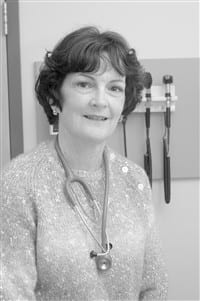Mission: Ongoing Fallon Community Health Plan Meets Early Goals, but Wants to Build on Its Foundation
When Fallon Community Health Plan (FCHP) entered the Western Mass. market just over two years ago, the Worcester-based HMO did so with goals that its president and CEO, Eric Schultz, described as “aggressive, but realistic.”
As he reviewed the company’s track record since, Schultz noted that the initial goals have been met or exceeded. “We’ve been very pleased with the progress we’ve made; Western Mass. is one of our fastest-growing markets.” Thus, he declared FCHP’s entry in this region a success — but one that certainly won’t go to his head.
That’s because, while he’s pleased with the number of members gained across the state (15,000, or about 7.5{06cf2b9696b159f874511d23dbc893eb1ac83014175ed30550cfff22781411e5}), and with the all-important retention rates for the first two years (95{06cf2b9696b159f874511d23dbc893eb1ac83014175ed30550cfff22781411e5}, which is slightly above the industry average), he knows the task ahead is to build on this beachhead. And this is a task defined by both challenge and opportunity in this time of change for the health-insurance sector and distress for the economy and businesses trying to steer through the whitewater of the worst recession in decades.
“Health care reform has changed the entire landscape in many different respects,” said Schultz, referring to legislation that now requires most people in the state to have some form of health care insurance. “The state created a new intermediary called the Connector, which has brought, on one hand, an opportunity for individuals and small groups to access health insurance using a new vehicle, but on the other, it creates one more player in the field.”
Expanding on that latter thought, he said the primary means of distributing or selling health insurance has been through brokers, which, by and large, are small employers themselves, and possess insight into a given market. “They’re the bread and butter to our success; they understand the needs of the employers and are the translators, if you will, when it comes to understanding what’s in the marketplace for the employer to select and what the employer’s needs are. They’re the ombudsman.
“Then, there’s the Connector,” he continued. “It’s being led by a board of 12 people with a variety of political interests; they’ve done a pretty good job of getting important decisions made to implement the law. But they don’t understand what’s going on Chicopee, and they don’t know what’s going on in Pittsfield, and that’s a drawback.”
Coping with the Connector, as well as rising unemployment, which casts more individuals out of current plans and into the marketplace, will be some of the overriding issues as FCHP seeks to build on the framework it has built in the 413 area code and other regions of the state. There will still be competition and several unknowns, said Schultz, who ultimately believes that his company is primed for further growth.
In this issue, The Healthcare News looks at Fallon’s performance to date, and what happens next for the latest in a line of HMOs to try to make an impact in the Western Mass, market — most without any real success.
State of the State
It’s called ‘Commit to Fit.’
That’s the name given to a broad program FCHP launched last fall to combat the alarming problem of childhood obesity. The initiative includes a variety of programs, activities, and support services to help educate and encourage children and their families to live healthier and more active lifestyles. The cornerstone of the endeavor will be a walking program for school-aged children, said Schultz, adding that FCHP is collaborating with the Mass. School Nurse Assoc. to bring the program to schools across the Commonwealth and the region.
“Childhood obesity is a ticking time bomb that’s going to go off in 10, 20, or 30 years if we don’t defuse it now,” he told The Healthcare News, adding that there are other components to the program focused on nutrition, including a set of trivia questions. Among the 60 are these: What two colors of vegetables should one eat more of? (dark green and orange), and which fruit is the richest in antioxidants? (blueberries).
‘Commit to Fit’ is just one of many initiatives large and small — others include everything from a Medicare Advantage plan the company now makes available to seniors to reimbursement for ski-lift tickets — that Schultz believes are contributing to the creation of solid value for members and the communities in which they live and work. That’s a prerequisite, he says, for gaining success (and market share) in a given region.
Another prerequisite is really knowing the communities one is trying to serve, and not merely knowing where they are on a map, he continued, noting that this is a mistake, or shortcoming, that has stifled the efforts of some HMOs to expand their footprints.
And FCHP is working to attain such success in several different markets it has entered as part of a broad territorial expansion plan. Started in Worcester in 1977 by a group of physicians called the Fallon Clinic, the company remained focused primarily on the Central Mass. region until only a few years ago. It expanded first into the eastern part of the state before setting its sights on the western counties (Berkshire County was the latest target, in early 2008), and then on the southeastern region.
The stated goals varied somewhat with each region, Schultz continued, but the overall strategy was the same — to make a somewhat quiet yet forceful entry into each market, establish a foothold, retain new members, and build on the foundation. And this is more difficult, he said, in what would be considered a low- or no-growth region like Western Mass., where the only way to gain market share (aside from those added through health care reform) is to take business from other, well-established players.
The key to meeting all these goals, he said, is to focus on the basics, and by that he meant listing to members and potential members, and responding with products and services to meet stated needs.
Foreign Policy
This process has been made somewhat more challenging, and intriguing, by some recent changes to the insurance landscape and the downturn in the economy and the resulting increase in unemployment, said Schultz, who returned to the subject of the Connector, which he described as “a mall without a salesperson.”
Elaborating, he said the Connector works largely in an online capacity, providing information through Web sites, thus connecting people with information they can use to make decisions. “People can go online and do some comparison shopping, and in that respect, for those that are comfortable with that approach, it’s very good.
“In fact, that where’s all of the health insurance industry is going, it’s much more of an online approach,” he continued, adding that this is all part of an ongoing evolution, one in which health insurance sales is becoming much of a retail operation. “You have more individuals out there making the decisions about the insurance they want to buy, where before it was handled much more through the employer, who would make the decision and give options to the employees.”
Now there are thousands of individuals essentially vying for themselves, he told The Healthcare News, adding that, while the market is providing more options, which is almost always a good thing for consumers, this bounty of options also makes things more complicated, even in Western Mass., where there are fewer choices than in other sections of the state.
And there will be even more vying for themselves during the coming months, he said, if projections on spiraling unemployment come to pass, which most economists believe they will.
“That’s the crystal-ball question for the year ahead,” said Schultz. “Now that we have health care reform and everyone is required to carry insurance, what happens to all those who will become unemployed?”
The short answer, he continued, is that more individuals will be moving into one of three types of subsidized health insurance — Medicaid, a product called Commonwealth Care, and another called Commonwealth Choice for those at 300{06cf2b9696b159f874511d23dbc893eb1ac83014175ed30550cfff22781411e5} of the poverty level. This phenomenon will bring additional fiscal challenges for an already-struggling Commonwealth, as well as burdens for individuals who must meet their share of that cost.
As for health insurers, Schultz stopped short of using the word ‘opportunity’ to describe what lies ahead for some players, including FCHP, instead opting to say that HMOs could become a safety net for the unemployed, with the bottom-line benefits, or burdens, to be determined largely by the state’s ability to pay.
“It’s something we’re watching very closely,” he said.
Members Bounce
Overall, the goal — and the challenge — for companies like FCHP in this changing, more-crowded marketplace is to stand out, said Schultz, noting that Fallon does so through its various programs, and also demonstrating (not stating) an understanding of the market. “You shouldn’t go into a market focused on who you are,” he explained. “A health insurer should go into the market focused on the needs of the businesses and individuals in that market. Why, for example, would someone want to go into Massachusetts with a product called ConnectiCare? It doesn’t make sense.”
What has made sense for FCHP is to focus on small businesses (under 500 employees) with local decision makers, and to have a local presence. To that end, the company has opened a regional office in West Springfield.
“We’re big believers in not making a lot fanfare when we come to a new place, but to grow steadily, and to have a steady voice,” he explained. “Often, I’ve found that when a company like this one comes into a market and starts making a lot of noise, they’re more into talking than listening, and we’re into listening.”
Listening and adapting.



Comments are closed.